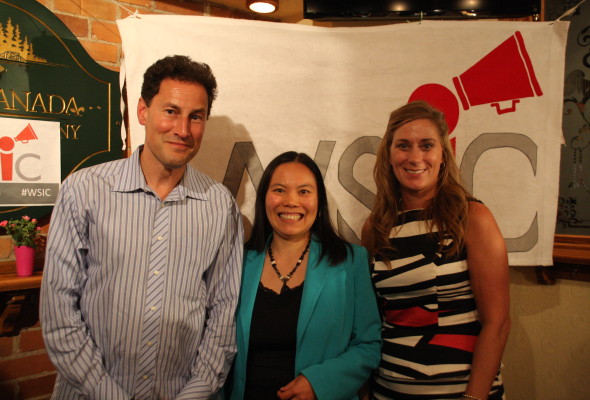On September 21st, WSIC had Carmel Smyth, president of the Canadian Media Guild, and Steve Paikin, host of TVO’s The Agenda speak about the role of public broadcasters in the age of the internet and social media.
CBC was created in 1932 by R. B. Bennett to keep American penetration to a minimum. Almost all developed nations have a public broadcaster but Canada might be the only one to do it in English, French, plus 8 native languages.
While social media is great at spreading news quickly, there’s a lot that it still can’t do. Smyth pointed out that CBC covered Toronto’s Pan Am games and Para Pan Am games. No broadcaster can do this at a profit and these games would receive no coverage at all if not for a public broadcaster. There is a benefit to having a public broadcaster who is not dependent on financial interests and can put the public good ahead of offending advertisers. The CBC costs Canadians a mere $29/person annually. This is half the average cost of a public broadcaster in developed nations ($54).
Steve Paikin questioned the idea of having borders when it comes to broadcasting when he was contacted by a Swedish organization urging their members to watch his segment on childcare. The reality is that all work crosses borders now. He also challenged Carmel’s assertion that the CBC functions as a public broadcaster. Little irks him more than commercial breaks while watching Peter Mansbridge. The CBC already functions as a hybrid model that is partially beholden to commercial interests and they should stop pretending otherwise. Paikin’s own show, The Agenda, runs without commercials and truly follows a public broadcasting model. Like CBC, TVO has also had to endure budget cuts and rather than trying to find sources of revenue to make up the shortfall, it had decided to take a different route and concentrate on doing fewer things very well.
Paikin recounts the story of a very generous man leaving $2 million in his will to TVO to ensure it continues the good work of public broadcasting. If he didn’t see the value in having a public broadcaster free of commercial interests, he would not have made such a generous donation.
A public broadcaster should be just that, public. There should be no commercial breaks and it should be free to cover the issues that for profit broadcasters won’t. While the CBC is great at challenging the government of the day (perhaps a reason for its funding woes), it doesn’t do nearly as good a job at separating out its commercial interests. A questioner from the floor brought up Amanda Lang not disclosing that she failed to disclose receiving money from companies she was reporting on. Rightly or wrongly, Canadians have set a higher standard for their public broadcaster.
The practice of making the CBC board political appointments has got to end. To truly serve the interests of the country, the CBC cannot be made a political football every election cycle. Smyth suggests using a multi party selection committee in lieu of the current PMO appointments.
At TVO, they are looking for ways to digitize old archives. Polkaroo was fondly brought up by Paikin. Neither for profit broadcasting nor social media have filled the educational role that public broadcasters once played.
Paikin’s final thought for the night is that public broadcasting will never win in a fight against health care or education. If we want a strong public broadcaster, we have to demand it.







